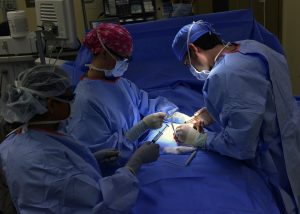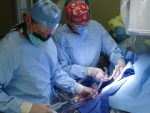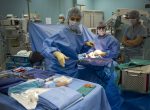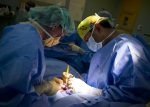
Surgical technologists are people who are in charge of both the operating room and patients.
Their main task is to assist surgeons in the operating room, ensuring that the patient and all necessary instruments are ready for surgery.
Sterilizing and preparing operating rooms, sterilizing and inventorying equipment, preparing patients for surgery by washing and disinfecting incision sites; passing surgeons instruments while they work are just some of their daily occupations.
However, the greatest responsibility is definitely making sure the operating room continues to stay sterile to prevent patient infection.
As you could notice, a surgical technologist is a vital member of a patient care team along with surgeons and nurses.
This profession is different from a surgical first assistant, who may assist the surgeon with suctioning or suturing a wound.
So as to become an assistant, you will need to have several years of experience working as a surgical technologist, you must have completed all of the education and examination requirements to work as a licensed surgical technologist, completed an accredited assistant program, and passed an exam.
Surgical technologists and first assistants are certified through the same body: the National Board of Surgical Technology and Surgical Assisting (NBSTSA).
States that require surgical technologists to get certified before working exist, but not many of them have set this requirement.
Nevertheless, employers are those who prefer or sometimes require that a surgical technician posses certification which is designed so that surgical technologists demonstrate they have knowledge and competency within a field.
Employers rather hire certified technicians, as they are sure these professionals have the ability to meet the demands of the job.
The certification shows that these people are qualified, devoted, and actively pursuing their careers.
Furthermore, gaining a certification makes you obliged to take continuous learning and improvement as you will need to reach continuing education and recertification.
So as to be eligible for a license, applicants must first obtain their associate degree in surgical technology from an accredited school.
Taking a certification exam is available to people who have finished these programs that usually take one to two years to be completed.
In order to be accepted in an accredited surgical technician program, you are required to possess at least a GED.
The program must be accredited by the Commission on Accreditation of Allied Health Programs (CAAHEP) or the Accrediting Bureau of Health Education Schools (ABHES) if you want to sit for an exam upon graduation.
Surgical technologists pass an exam through the National Board of Surgical Technology and Surgical Assisting (NBSTSA) to be considered a Certified Surgical Technician (CST) or they can gain certification through the National Center for Competency Testing (NCCT).
This certification is referred to as a “Tech in Surgery – Certified” or TS-C (NCCT).
As certification for this field is at the national level, surgical technologists will be allowed to use their certification regardless of what state they practice in.
After passing the NBSTSA, certified surgical technicians can apply for membership with the Association of Surgical Technologists (AST) – a professional organization that offers resources to them so that they can stay informed about new trends and developments in the field.
Page Navigation
National Board Of Surgical Technology And Surgical Assisting (NBSTSA) – Certified Surgical Technologist (CST)
The CST certification is offered by the National Board of Surgical Technology and Surgical Assisting (NBSTSA).
This kind of license provides future surgical technologists the chance to express their clinical skills and educational background.
The exam consists of 175 questions and so as to pass it, applicants must answer at least 102.
This would be a 70 percent pass rate, and you need to note that only 150 of the questions on the test are scored.
The remaining 25 are used to test exam questions.
Questions are multiple-choice and you will be offered four potential answers to choose from.
You can benefit from the NBSTSA practice examination, as well as a reference handbook and content outline.
The test covers a broad area of knowledge, including the following topics:
- Preoperative preparation
- Intraoperative procedures
- Postoperative procedures
- Administrative and personnel protocols
- Equipment sterilization and maintenance
- Anatomy and physiology
- Microbiology
- Surgical pharmacology
Not everyone is allowed to sit for this exam, and there are two paths which you can take so as to become eligible for it:
- Graduates of a Surgical Technology Program: Complete a CAAHEP- or ABHES-accredited program, as well as provide a copy of your unofficial transcript, notarized letter stating your graduation date, or a copy of your graduation certificate.
- Graduates of a Military Training Program in Surgical Technology: Complete a program that has not yet received, in the process of receiving, or has received CAAHEP accreditation, as well as provide a copy of DD214 stating the base where the program was completed, a graduation certification, or a smart transcript.
Our suggestion is to enroll in accredited programs that can be found on CAAHEP or ABHES websites.
The cost for the CST exam is $190 for members of the Association of Surgical Technologists and $290 for non-members.
National Center For Competency Testing (NCCT) – Tech In Surgery – Certified (TS-C)
The TS-C certification is offered by the National Center for Competency Testing (NCCT).
This kind of licensure focuses on providing a way to certification for surgical technologists already working in the field.
Its exam has an overall 73 percent pass rate.
When it comes to eligibility for the NCCT exam, three options are available: education, experience, and military education/experience.
Those who took the exam through the education eligibility option had an 81 percent pass rate. Those who took the exam through the experience and military eligibility option had a 97 percent and 100 percent pass rate.
It is worth noting that the military eligibility option has a much lower number of applicants than the experience and education eligibility options.
This test has 175 questions and 25 of these questions are not scored.
You will be given four hours to finish the multiple-choice exam.
The NCCT provides a detailed test plan to help applicants prepare for the exam as well as a candidate handbook.
The test covers the following topics:
- Setting up for a surgical procedure
- Executing patient safety
- Applying sterile technique
- Assessing the integrity and sterility of items
- Utilizing preference cards
- Documenting unusual events
- Understanding environmental safety
- Preparing the operating room
- Documentation
- Understanding basic sciences as they relate to surgical procedures
- Supporting the needs of the surgeon
- Executing the end of procedure tasks
- Preparing supplies
- Recognizing post-operative complications
- Executing end-of-case procedures
As we have already mentioned, there are three options to become eligible for the NCCT TS-C credential exam:
- Education Option for current students: You will need to complete a surgical technology program at an NCCT-authorized school, as well as have a GED or high school diploma. Furthermore, you will need to submit a copy of the surgical technology diploma, a certificate of completion, or a transcript with a graduation date within 60 days of graduation. You must also complete a TS-C Critical Skills Competency Form within two years of taking the exam. These documents are not required to take the exam, but you cannot be considered “certified” until they are submitted. The exam fee for students is $155.
- Education Option for recent graduates: Recent graduates are also required to complete the same requirements as current students, but they must submit the required documents before taking the exam. If they wait longer than nine months to take the exam, the cost increases to $195.
- Experience Option: The applicant must have three years of experience working as a surgical technologist. Specifically, they must have three years of full-time employment or 6,240 hours within the last five years working as a surgical technologist under the supervision of a certified/licensed physician, primary care provider, and/or RN. Furthermore, they have to hold a GED or high school diploma and complete a TS-C Qualification by Experience form prior to taking the exam. The exam fee for these technologists is $195.
- Military Option: This option is available to those who are currently in the military or who have completed their service within the last five years. If they have completed a surgical technology training program within the last five years, they are eligible to take the exam. They must also provide a copy of a smart transcript or DD214, complete a TS-C Critical Skills Competency Form, and have a high school diploma or GED.
- Another option for military applicants is to take the exam if they have three years of full-time experience as a surgical technologist within the last five years and are either a member or spouse of an active, retired, or veteran of the Armed Forces. They must have three years of full-time employment or 6,240 hours within the last five years working as a surgical technologist under the supervision of a certified/licensed physician, primary care provider, and/or RN. They must also hold a GED or high school diploma and complete a TS-C Qualification by Experience form prior to taking the exam.
Those pursuing the military option must pay a $155 exam fee.
Certification Renewals – NBSTSA And NCCT
Getting a certificate does not mean that you do not have to study anymore.
Surgical technologists are required to recertify their CST (NBSTSA) credential every two years and the annual renewal deadline is the date you were originally certified.
So as to be able to renew your license, Certified Surgical Technicians take continuing education credits through the Association of Surgical Technologists (AST).
They must have taken 30 credits of continuing education courses within the last two years or pass a recertification examination.
The cost of the examination is $399 if you are a current member of the Association of Surgical Technologists and $499 if you are not a current member.
Those with a TS-C (NCCT) credential need to renew their credential annually, by completing 14 continuing education credits and paying a $77 fee.
These credits may be taken through the NCCT or through another organization, but they must meet professional standards.
State Certification & Licensure For Surgical Technologists
When it comes to credentials necessary to practice your profession as a surgical technologist, states vary in their registration, licensing, and certification requirements.
There are states which require certification while others do not require surgical technologists to pursue any formal recognition through the state.
It is our suggestion to check with the licensing board in your state for current information on the application and continuing education requirements so as to make sure you meet them.
As an example, we will mention California, the state that does not require surgical technologists to have certification prior to working.
On the other hand, there is Illinois, the state which requires those working as a surgical technologist to receive and maintain licensure through the state Department of Financial and Professional Regulation (IDFPR).
Those applying must either pass an exam administered by the state, hold credentials from a qualifying national examination body, or hold a license from another state with requirements similar to Illinois.
The application fee is $100 and must be recertified by April 30 of each even-numbered year, but the good thing is that there are no continuing education requirements.
In those states that require surgical technologists to register or get licensed at the state level, you can expect different renewal procedures, and they can range from two to five years.
Those applying for recertification will be required to demonstrate fulfillment of all certification requirements, pay a fee, and update their contact information.
In case they have formal disciplinary actions filed against them or they have received a conviction, they must disclose it, as well.








